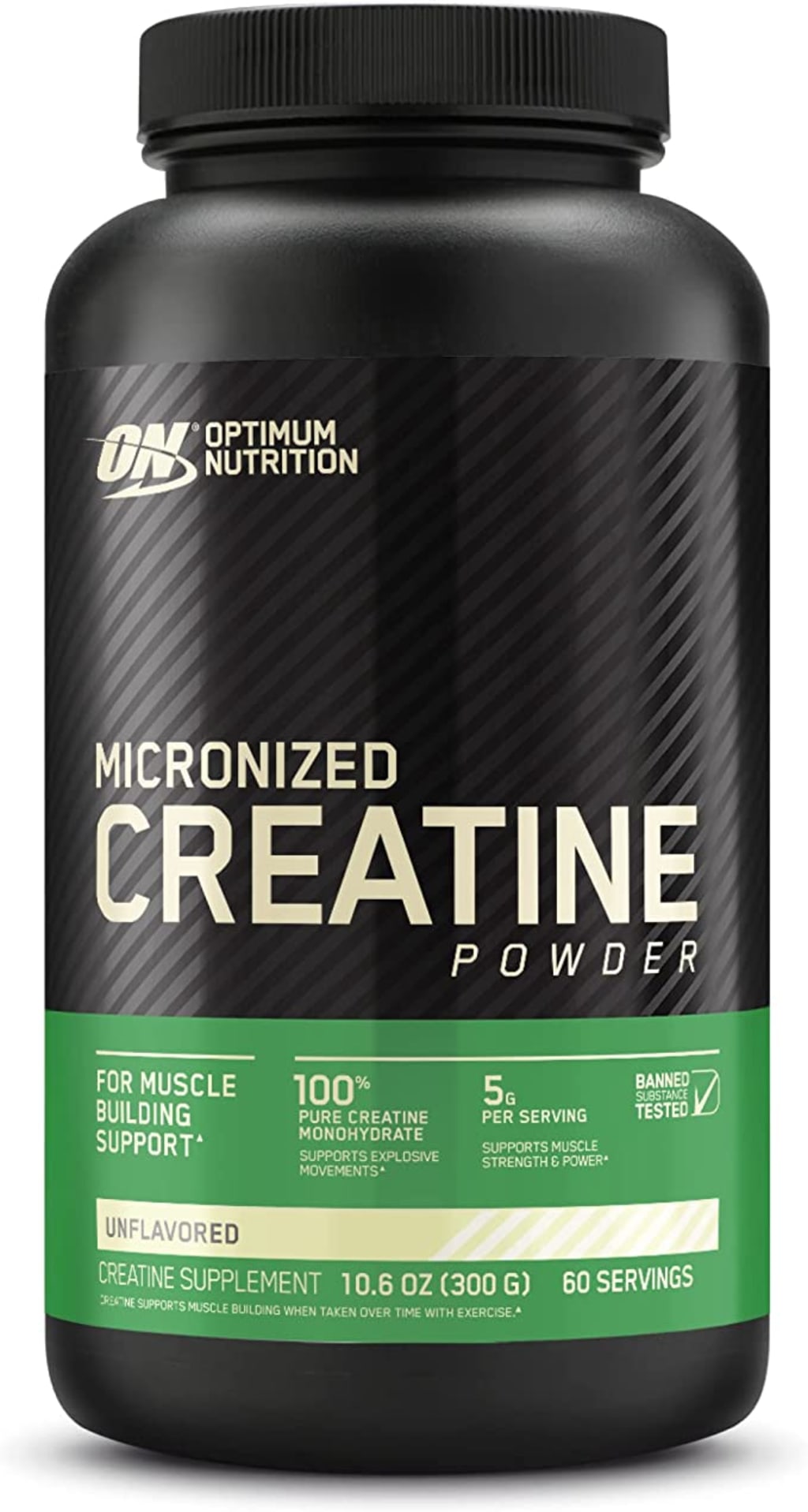Creatine: uses, benefits, side effects, and more
If you're the type of person who buys popular supplements like protein or collagen powder, you've seen another popular bottle on the shelves: creatine. This supplement, which is often used in powder form (it is mixed with protein shakes, applesauce, oatmeal, etc.), is an important part of the body and some other sports communities are thanks to its ability to help you pack on muscle and work longer. and power. Although creatine is generally considered safe - and is one of the most studied supplements - it is still a supplement, meaning that it is not regulated by the Food and Drug Administration (FDA) and that the product's claim does not need to be approved (although the FDA can remove products that are deemed unsafe).

What is creatine and should I take a supplement?
Creatine is an organic acid that our bodies produce naturally and that we get from eating certain foods, including seafood and red meat.
Our bodies store creatine in our muscles so that we can access it more quickly for high-intensity exercise, such as sprinting or weight lifting, says Autumn Bates, a fitness consultant at fitness sports practice in private in Manhattan Beach, USA. . "It's a non-essential amino acid, meaning your body makes it and you don't need to get it from food."
Click here to purchase creatine
But you don't need more creatine than what's in a healthy, balanced diet, Bates adds. "Creatine is not an essential nutrient," he says. "Your body makes it from the other amino acids you get from different protein sources."
When it comes to creatine supplements, there are many different options for taking it, and not all are created equal. "There's a lot of debate about which type has the highest bioavailability — which is the best," Bates says.
So how much creatine does my body really need? If you don't lift heavy weights, do high intensity exercise, or follow a vegetarian or vegan diet, your body can produce creatine as it needs. "Creatine is found in animal products," says Bates, "so your body can produce more creatine as long as you eat a balanced diet that includes animal products." Protein sources like beef, chicken, pork and fish help your body produce the creatine it needs - this varies by source, but, in general, a 3-ounce serving of meat will contain as 0.4 grams (g) of creatine. Bates said.
Learn more about eating meat-free
Everything you need to know about being a vegetarian
If you want to take creatine as a supplement for bigger and stronger muscles, the standard practice is to have a "loading period" where you increase your creatine intake significantly for a few days or weeks. "It can start your muscles increasing the amount of creatine they retain," says Bates. "During the loading period, you usually take 5g of creatine four times a day, rather than 20g per day. After the loading period, you reduce the amount of creatine you take to a "repair" level of 3-5g per day. (This is also the recommendation of the International Society of Sports Nutrition.)
Click here to purchase creatine!!!
There's no need to overdo your creatine intake, though, in your pursuit of lean muscle mass. "The maximum amount of creatine you can take depends on the type of fitness you have," Bates says. “So if you're more fit, your body can store more creatine. In total, muscles can contain about 2-3 g of creatine per kilogram of body weight. Therefore, the amount of creatine you use will depend on how good your body is.
Studies have found that staying at 3-5g per day for maintenance is good, and although high levels have been tested in severe conditions without adverse effects, there is not enough evidence to determine long-term safety. If you want to increase your creatine intake, you should work with your doctor or nutritionist to make sure it fits your goals and your health history.
Why do people use creatine supplements?
The most common use for creatine supplementation is to help achieve exercise and athletic goals. Bodybuilders, weightlifters, endurance runners, wrestlers and other athletes use it to improve fitness and improve performance, endurance and recovery time. . It is especially useful in games that require short, high-speed operations. "Short, quick movements use a different energy system than aerobic exercise," Bates says. "He usually uses creatine. So, in theory, the more you store creatine, the more time you have before fatigue. Examples might include running or throwing a football field, both of which involve quick bursts of energy.
Creatine, an amino acid, helps your body produce more adenosine triphosphate, or ATP, a small molecule that is your body's main source of energy. But research shows that your body can store enough ATP for 8-10 seconds of intense exercise - and then it will generate new ATP as you continue.
If you are training at your maximum intensity, your body cannot produce enough ATP to keep going. That's where creatine supplements come in: they can help increase your body's phosphocreatine stores (a compound of creatine and phosphoric acid stored in your body) to produce ATP energy during intense exercise. strength.
Click here to purchase creatine!!!
All this is good for bodybuilders. Creatine supplements can increase muscle mass 2-3 times more than training without it, and double the amount of muscle tissue and double the weight a person can bench press at the same time. and carriers.
In other studies, creatine was determined to be the most effective supplement available for adding muscle mass among six supplements with sufficient data to be analyzed in a meta-analysis.
Bodybuilders aren't the only ones who can benefit. Research has found that creatine supplementation can improve performance in track sports (such as sprinting), combat sports (such as boxing), team sports (such as basketball), and others. Other studies show that creatine supplementation helps muscles recover faster and reduces muscle damage after intense exercise. It has also been shown to help muscles hold onto more glycogen (stored fat) than they can. Active vegetarians and vegans may also benefit from creatine supplementation if they are deficient in their diet, and children with rare creatine metabolism disorders may see improvements in some symptoms, take a creatine supplement.
Are creatine supplements safe to take?
Creatine is considered safe when used properly and is not considered a restricted substance by the International Olympic Committee and the National Collegiate Athletic Association. It is important to know that although it will not help anyone who uses it, it probably won't hurt him either.
"If you're an athlete looking to face competition, maybe creatine can help you," Bates says. "However, if you're using creatine as a supplement to your exercise routine, you may not need it."
Click here to purchase creatine!!!
Additional information
There are many reasons why the FDA has banned caffeine supplements
However, any supplement should be used with caution and after consulting a nutritionist or doctor. Professional or collegiate athletes should be sure to choose a creatine supplement approved by NSF International or Sports Informed. These are the teams that test nutritional supplements to make sure they are safe and free of substances banned by sports teams.
There are health risks and side effects that you should be aware of before taking creatine. Muscle spasms, nausea, diarrhea, headaches, abdominal pain, thirst, weight gain, water retention, heat intolerance, and fever have been associated with the supplement.
Weight gain can be a common side effect. "Creatine can cause your body to retain water by drawing water into your cells through osmosis," Bates says. "It doesn't necessarily make you gain weight like fat, but it can increase edema or water weight." Additionally, muscle is denser than fat, so in some cases gaining muscle can increase overall body weight (even if you're burning fat at the same time). There is also concern that creatine can cause kidney damage, doctors warn that those with a history of kidney disease or conditions, such as diabetes, that increase the risk of kidney problems should avoid supplements. Combining creatine with nephrotoxic drugs - drugs that can damage the kidneys - such as non-steroidal anti-inflammatory drugs (NSAIDs), such as ibuprofen (Advil) and naproxen sodium (Aleve), should also be avoided, according to the Department According to the US. of Health and Human Services.
Are there other health benefits of creatine?
Creatine isn't just for muscle growth. "Recently, there's been some really interesting research on creatine in terms of brain health," Bates says — especially in groups of people who may be deficient in creatine because of their diet or other things.
Click here to purchase creatine!!!
Learn more about attachment
New evidence that your daily multivitamin doesn't help you live longer
In adults and vegetarians and vegans (who may have low creatine levels to begin with), some studies show that these can increase the ability to concentrate faster. tools and think carefully when they take supplements. creatine, said Bates.
It is important to note that the participants in the study who found this effect were already deficient in creatine. More research should be done to see if people with normal creatine levels can get the same cognitive benefits from supplementation. Creatine can also help prevent your skin from showing signs of aging. Daily application of cream containing creatine for six weeks reduced skin and wrinkles in men in one study; and various studies found that creams containing creatine and folic acid improve sun damage and reduce wrinkles.
6 supplements for glowing skin and beautiful hair
In some early research, it was looked at whether creatine can help reduce symptoms in patients with heart disease or make the problem worse by increasing blood flow and increasing physical endurance and physical strength. So far, there has not been enough evidence to support it. Other studies show that the use of creatine shows that it offers many benefits to women, especially postmenopausal women, in terms of strength, bone density, mood and cognition - but this area is also in demand another study.
Bottom line: If you want to increase muscle mass and strength or exercise for a long time, creatine can be a useful addition to your diet. But if you are going for a low weight or a low intensity period, make sure you eat a lot of animal foods with protein, and your body will be fine.





Comments
There are no comments for this story
Be the first to respond and start the conversation.